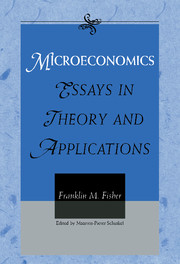Book contents
- Frontmatter
- Contents
- Introduction
- Part I Disequilibrium and Stability
- 1 The Formation of Economic Magnitudes: Disequilibrium and Stability (1990)
- 2 Quasi-Competitive Price Adjustment by Individual Firms: A Preliminary Paper (1970)
- 3 Stability and Competitive Equilibrium in Two Models of Search and Individual Price Adjustment (1973)
- 4 On Price Adjustment without an Auctioneer (1972)
- 5 Quantity Constraints, Spillovers, and the Hahn Process (1978)
- 6 On Stability Analysis with Disequilibrium Awareness (1988)
- 7 It Takes t* to Tango: Trading Coalitions with Fixed Prices (1989)
- 8 An Alternate Proof and Extension of Solow's Theorem on Nonnegative Square Matrices (1962)
- 9 Choice of Units, Column Sums, and Stability in Linear Dynamic Systems with Nonnegative Square Matrices (1965)
- 10 A Simple Proof of the Fisher–Fuller Theorem (1972)
- 11 Gross Substitutes and the Utility Function (1972)
- Part II Welfare Economics and Consumer Theory
- Part III Applications of Microeconomic Theory
- Part IV Industrial Organization, Economics, and the Law
- Part V Public Policy Applications
- Epilogue
- Indexes
6 - On Stability Analysis with Disequilibrium Awareness (1988)
Published online by Cambridge University Press: 20 March 2010
- Frontmatter
- Contents
- Introduction
- Part I Disequilibrium and Stability
- 1 The Formation of Economic Magnitudes: Disequilibrium and Stability (1990)
- 2 Quasi-Competitive Price Adjustment by Individual Firms: A Preliminary Paper (1970)
- 3 Stability and Competitive Equilibrium in Two Models of Search and Individual Price Adjustment (1973)
- 4 On Price Adjustment without an Auctioneer (1972)
- 5 Quantity Constraints, Spillovers, and the Hahn Process (1978)
- 6 On Stability Analysis with Disequilibrium Awareness (1988)
- 7 It Takes t* to Tango: Trading Coalitions with Fixed Prices (1989)
- 8 An Alternate Proof and Extension of Solow's Theorem on Nonnegative Square Matrices (1962)
- 9 Choice of Units, Column Sums, and Stability in Linear Dynamic Systems with Nonnegative Square Matrices (1965)
- 10 A Simple Proof of the Fisher–Fuller Theorem (1972)
- 11 Gross Substitutes and the Utility Function (1972)
- Part II Welfare Economics and Consumer Theory
- Part III Applications of Microeconomic Theory
- Part IV Industrial Organization, Economics, and the Law
- Part V Public Policy Applications
- Epilogue
- Indexes
Summary
Introduction
Most of the existing literature on the stability of general equilibrium suffers from a common problem – the assumption that individual agents are unaware of the fact of disequilibrium. Under tâtonnement, agents take current prices as given and report their demands as though the economy were in Walrasian equilibrium. In “non-tâtonnement,” no-recontracting models (such as the Edgeworth process and the Hahn process), agents formulate demands again taking prices as given and paying no attention to the fact that they will often not be able to complete their planned transactions. In both types of models, the agents act as though they were in Walrasian equilibrium and simply fail to notice either that prices are not Walrasian and may change or that transactions may not be completed.
Plainly, it is desirable to allow agents to have some idea of what is happening in disequilibrium and this paper attempts to do so in one particular way, by allowing them to recognize that notional demands may not always be satisfied. Indeed, in one sense, we go to the other extreme, permitting agents fully to understand the mechanism through which expressed demands are translated into actual trades.
We consider a wide class of deterministic mechanisms for a pure-exchange economy. Each such mechanism takes the demands expressed by agents and produces actual trades that clear all markets. We assume the trading mechanism is common knowledge.
- Type
- Chapter
- Information
- MicroeconomicsEssays in Theory and Applications, pp. 130 - 142Publisher: Cambridge University PressPrint publication year: 1999



